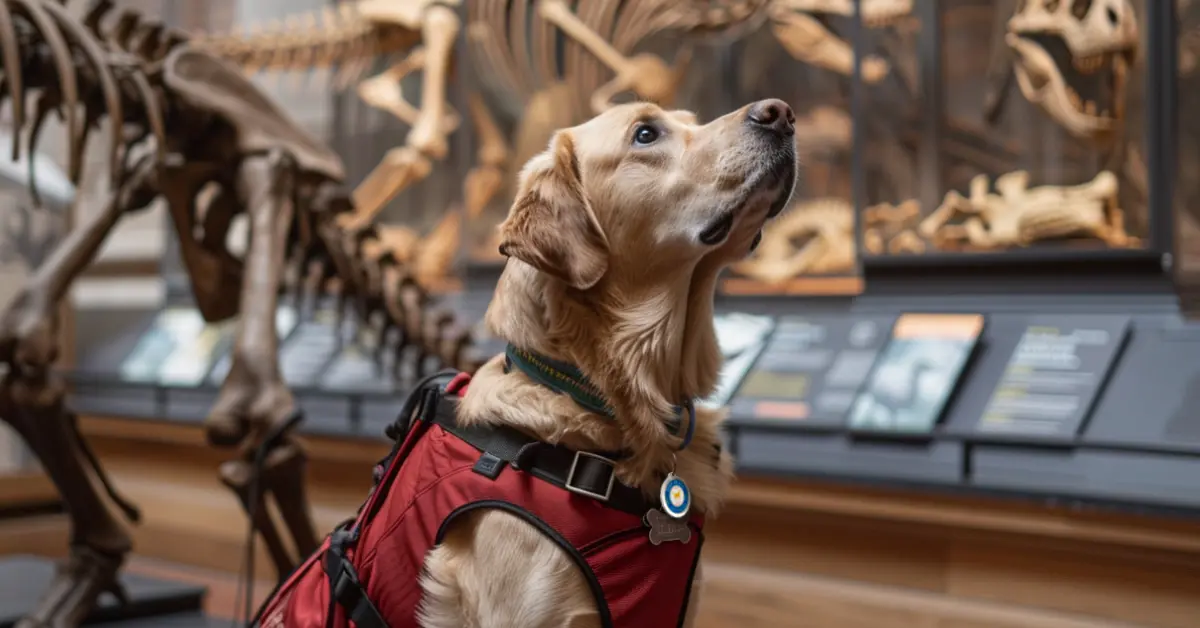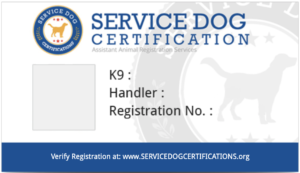Service Dog Letter For Landlords: Why You Don’t Need One

Service Dogs and Their Rights
Service dogs have numerous rights under federal laws. These laws allow service dog owners to be accompanied by their assistance animal in public locations, during travel, and in their residences. To qualify for a service dog, a person must have a qualifying physical or mental health disability that requires the use of a trained service dog.
When it comes to housing, service dogs are exempt from “no pets” policies in residential buildings under the Fair Housing Act. Service dogs are also exempt from pet fees and deposits, as well as size and breed restrictions that are applicable to normal pets.
The Fair Housing Act also protects emotional support animals, which are a different category of assistance animals. Emotional support animals help with mental health disabilities and do not need any specialized training.
Another major difference between service dogs and ESAs is that ESAs require an ESA letter from a licensed healthcare professional as proof, whereas service dogs do not require special documentation.
How Do I Prove I Have A Service Animal to my Landlord?
The ADA and Fair Housing Act do not require service animals to have vests, ID cards, registrations, certifications, letters, or gear that identifies them as service animals. Service dog owners commonly use these accessories, but they are not required. Third parties cannot demand to see these items before granting access to a service dog on the premises.
You also cannot qualify for a service dog by obtaining an ID card, registration, or certification. You can only obtain these items after you have already fully qualified for a service dog and can represent that you have a legitimate service animal for your disability.
So how do you prove that you have a service dog to your landlord? If the disability-related need for the service dog is not obvious, your landlord can ask you two questions: 1. Is the dog a service dog required because of a disability? and 2. What work or task has the dog been trained to perform?
Disabled tenants with disabilities have a right to privacy and dignity. Landlords cannot ask the tenant to have their dog demonstrate the task it has been trained to perform or request the tenant’s medical records.
While you do not need service dog paraphernalia, it can be helpful to have things like vests, IDs, and certificates to easily signal to other tenants that you have a service dog and not a normal pet.
Service dog owners do not need to submit documentation such as a letter from a doctor or therapist. However, some tenants with psychiatric service dogs will obtain a PSD letter confirming they have an eligible mental health disability such as severe depression, anxiety, or PTSD. PSD letters are optional but provide peace of mind for current or potential owners of psychiatric service dogs.
So, What Animals Need A Letter?
Under HUD guidelines, owners of emotional support animals should submit a letter from their licensed healthcare professional to their landlord. Landlords are entitled to see a valid ESA letter before accommodating an ESA in a no-pets building. ESAs are also exempt from pet fees and pet restrictions on size, breed, and weight.
An ESA letter verifies that a tenant has a mental health condition like depression, anxiety, or PTSD that is helped by the presence of an emotional support animal. While service animals can only be dogs, ESAs can be dogs, cats, birds, fish, and other small household pets. Emotional support animals have housing rights but not the broader public access rights of service dogs because they are only protected under Fair Housing rules, and not the ADA.
Need an ESA Letter? Read how to get one online here.
See if you qualify for an Emotional Support Animal letter from ESA Doctors by clicking the link below.
About the Author: The writing team at Service Dog Certifications is made up of folks who really know their stuff when it comes to disability laws and assistance animals. Many of our writers and editors have service dogs themselves and share insights from their own experiences. All of us have a passion for disability rights and animals.
41 comments
Leave a Reply Cancel reply
Latest Posts

Can you bring a service dog to a museum?
Yes, you can bring your service dog to the museum! All the major U.S. museums welcome guests with service animals in accordance with the Americans with Disabilities Act (ADA). There are some areas, however, that might be off-limits. Here’s what you should know if you plan to spend a day at the museum with your […]

Read More

How to Bring a Service Dog to Six Flags Magic Mountain
Service dogs are welcome at Six Flags Magic Mountain so long as they are, according to Six Flags, “trained to do work or perform tasks for people with disabilities.” Of course, your dog must be housebroken and remain on a leash or harness and under your control while at the park — and the park […]

Read More

When Stores Can Refuse Your Service Dog
According to the Americans with Disabilities Act (ADA), service dogs should be allowed into any store most of the time. A store owner can legally exclude a service dog if they are actively growling, snapping at, or frightening customers, or if the dog is obviously out of the control of its owner. Ordinary behaviors — […]

Read More




Question, I am looking for a place to live and I am finding it difficult because of my Pittie. I have a letter from the doctor a few years back that says he needs to be with me because of the anxiety I have without him, however, once I tell the landlord I have a Pittie, they want nothing to do with me. How will this ESA letter help me when sending in an application for a rental? Do I send it with the application? Is there a timeframe on a letter from your doctor?
A landlord may require documentation of your disability to have on file. They have no right to ask questions about the animal except the two allowed by the ADA: is it a service animal & what service does the animal provide for you. They may not ask ANYTHING beyond that; including the animals breed.
Landlords cannot discriminate based on canine breed if it is a service animal or emotional support animal. Your disability and your letter will protect your rights to avoid discrimination. But understand that you are still responsible for any damages caused and are required to keep the canine under control at all times (although I have found that service/emotional support dogs typically don’t cause damage). If there has been discrimination, I would recommend contacting your local HUD or Equal Opportunity Housing Office to report the discrimination, or maybe inform the landlord of the laws and the lawsuit they can face for the discrimination. Landlords/Property Management companies also cannot retaliate in anyway because they disapprove. Hope that helps!
I have been watching dogs for 11 years, have many clients. I’ve recently moved to another apartment complex that only allows service dogs. All these dogs are my life and support. Can I qualify for a service dog permit?
No, you cannot qualify for a service dog unless you yourself have a disability that requires a dog with specialized training to perform tasks for you. In addition, no permit or any other documentation is required for a service dog. You need to have 1. a qualifying ADA disability and 2. A task trained service dog.
All you need to say is you have a PSD or an ESA. Also make sure your dog IS TRAINED. Once you tell them you have a PSD, PPD or ESA they cannot ask you any other questions and the only paperwork you have to submit if ask for is the letter. Psd’s are psychiatric service dogs, ESA’s are emotional support animals and PPD’s are personal protection dogs, usually military vet dogs or police K-9’s. The letter is a prescription and the prescription expires after a year. Keep in mind that all prescriptions expire after a year. So you’d have to get your doctor to renew the letter every yr. I sued my last landlord for disability discrimination and I won over a million.
For ESAs, you need an ESA letter from a mental health professional while you actually do not need any form of documentation for a service dog. For service dogs, landlords can ask two questions for verification: 1. Is the dog a service dog required for a disability? and 2. What work or task has the dog been trained to perform?
Hi,
I have a disability and just recently got a dog that I am training myself as a service dog. My dog is extremely well behaved and behaves just like most other fully trained service dogs. He just needs a little bit of fine tuning still with some of the more difficult things such as heeling, proofing, and sitting for long periods of time.
I brought my dog to the attention of the manager of my apartment complex and she is requiring a doctors note for him. When I explained my rights and told her that a doctors note is legally not required or allowed to be asked for, she told me that it was and that it is required for them to have on file.
Am I missing something, or are my rights being violated? I could get a note from my doctor but that’s not really the point. She was extremely rude about it and I feel like she just doesn’t believe that my dog is in fact a service dog. I also just recently moved to this state and don’t have a new doctor yet, so I am nervous about asking a brand new doctor who doesn’t know me yet for a doctors note.
She has not actually met the dog yet or even asked to meet him. This has all occurred through email. All she has asked for is a “pet deposit fee” and has not even asked for vet records either, which I would think would be of more importance to make sure the dog is not rabid.
I am thinking of filing a complaint but just want to be absolutely sure I am within my rights before going to that.
Thank you!
Ashley
(I’m not a lawyer who specializes in the ADA or the FHA.)
It sounds like your dog is still an emotional support animal (ESA) and not (yet) a Service Animal (that can not be denied by your landlord under the ADA). Unless your state has additional provisions, under the FHA you do need a letter from an appropriate medical professional for your pet to qualify as an ESA and I believe your landlord is within their rights to require proof of such. A Service Animal is not required to provide such documentation, but the owner/trainer can be asked two questions:. if they are indeed a Service Animal and what task they are trained to perform. Lying about being a Service Animal can carry penalties under law (check the laws of your state). So, If your dog is still working on some basic commands (heeling, staying for long periods etc.), it sounds like your dog is just working towards being a Service Animal as the AKC notes that dogs in training should be able to perform foundation skills, including “eliminating on command in different locations.” Also, what makes a Service Animal different from an ESA is that they have a job (perform a task) and aren’t just for comfort/companionship. Service Animals in training are not always afforded the same rights as actual Service Animals and you should check your state laws.
The AKC has a great resource page with a lot more information located here: https://www.akc.org/expert-advice/training/service-dogs-101-everything-you-need-to-know/ . You may also find the following helpful in figuring out what differentiates a Service Animal from an ESA:
“A service animal means any dog that is individually trained to do work or perform tasks for the benefit of an individual with a disability, including a physical, sensory, psychiatric, intellectual, or other mental disability. Tasks performed can include, among other things, pulling a wheelchair, retrieving dropped items, alerting a person to a sound, reminding a person to take medication, or pressing an elevator button.
Emotional support animals, comfort animals, and therapy dogs are not service animals under Title II and Title III of the ADA. Other species of animals, whether wild or domestic, trained or untrained, are not considered service animals either. The work or tasks performed by a service animal must be directly related to the individual’s disability. It does not matter if a person has a note from a doctor that states that the person has a disability and needs to have the animal for emotional support. A doctor’s letter does not turn an animal into a service animal.” ( https://adata.org/publication/service-animals-booklet )
Those resources should help you decide your next course of action. But, in my humble opinion, bearing in mind that I’m not an attorney, I do not believe that the landlord is violating your rights as it does not sound like your dog has finished training, nor trained to perform a task for you based upon the information you provided and is instead an ESA. But, either way it sounds as though your landlord is allowing you to put down a pet deposit, so if you pay that and any associated costs in order to have a pet in a rented property, you’ll be able to live there. The fact that they appear to accept pets is great news!
If you are going through the intensive daily training to have your dog become a Service Animal which performs a job for you, once you reach that point (as training never really stops), you should have no issue changing your pet’s designation with the landlord. As someone who is also disabled, I wish you all the best. Good luck!
First id like to say most of what u said was on point but for a service animal to be a service animal it has to prove a service well hate to brake it to u but a esa is a service animal to be a service animal it must do a job for ur disability well dont tell me u forgot this thing called a mental disability providing emotional support is providing a service to the mentally handicapped ( and idgaf what the law says we going on pure logic here ) alot of time law and logic dont match and sorry I’ll say fuck the law and go with logic in my state I’m not required to prove anything not about my disability and not
anything about my dogs paperwork so I’d say that landlord is violating they rights u dont have to prove it and they have to allow it
Join IADI and back track the required 120 hours of training for a Service Dig. However, if your dog doses the have heeling and ad he CGCA is a Service Dog in Training.(SDIT)
Does your state consider SDIT (Full Access) regarding housing and public access?
She can’t legally ask for a pet deposit fee either. Yes your rights are infringed (I think I used that word right) upon.
https://www.rentprep.com/property-management/landlord-guide-assistance-animals/
What has to be on file is your document of disability, which a landlord may require to be on file. The animals credentials are “your” word; not your physicians. Once you provide your disability documentation to your landlord the ADA will support you & your right to have your animal.
Addendum: Your landlord has the right to request your documentation of disability if you are presenting an animal as service related. Otherwise, not related.
What do you mean by ducument of disability? Would my SSDI paperwork suffice?
They’re not required to ask for your private health records to prove you’re disabled. Illegal.
Can the property manager as for the ESA letter to be a specific letter? She wants the form she made copied onto the healthcare provider’s letterhead and then sign AND notarized? Is this legal?
#3 on this link should be helpful. Hopefully you got this resolved already! https://esadoctors.com/hud-housing-rules-emotional-support-animals/#landlordunreasonable
The answer is right here in this column!
I just had insults from staff of my apt. Bldg; a place I hate! Guy says insulting things very sweetly he literally gave me a sick stomach! Fight this very real damage to people with non of the advantages but one or two and my SD was trained by me using Top Dog, Low cost for lessons and they worked me hard! Very professional! You can call with questions it’s excellent! My dog has been licensed for most of her 15 years she yesterday lay in my lap at the dentists office for an entire procedure about 2 hours! She is an IG and she is brilliant!
The letter should have the doctor’s information along with his medical license number so the landlord can look him up and make sure he’s really a doctor. Otherwise they are to have no direct contact with him. Your doctor would not talk to him anyway because of HIPPA laws. It doesn’t have to be a “specific” letter, but should state that you need the service dog and that it would mitigate your symptoms.
Just one point of clarification: you do need a letter for an emotional support animal, but not for a service dog.
Our landlord is requesting a $200 pet deposit. this was prior to my husbands accident and now will get a service dog. are we now required to pay the $200 pet deposit?
No that’s illegal to charge a deposit on a service animal and a esa is a service animal its providing mental health service
And ESA is not legally or technically defined as a trained service dog under the Americans with Disabilities Act. It is an animal which provides emotional, or mental support to treat a definitive mental health issue to the owner.
An actual Service Animal, is an animal which has been trained to perform certain physical tasks that its owner or handler cannot do without accommodation or the assistance of someone else. It has nothing to do with the mental health of the patient, but instead has to do with the physical help or assistance or aid of its owner or handler. So an emotional support animal is just that it is a support animal. a service animal is an animal is trained to perform a service to its owner or handler. Support animals not performing any service but making somebody feel better in their mind. Whereas a service animal is getting up and doing physical activities for the one who’s deemed its handler or owner.
An ESA is treated the same as a SD under FHA. The rules apply the same for both. They are called “assistance animals”.
No, your landlord cannot ask for any pet-related fees, since a trained service dog is considered a medical necessity. But in order to have a legitimate service dog, your dog would need to be specifically trained to support your husband by performing a task he cannot perform himself in times of need. Until your dog is fully trained, it would not qualify as a service dog. Unfortunately, there is no “Service Dog in Training” status. You may find this article on Service Dog requirements interesting https://www.servicedogcertifications.org/how-to-register-service-dog/
Some states do provide the same benefits for “in training” dogs.
Hey there,
My name is Jayce and I have a service dog.
I’m currently working on moving into my new apartment complex and they’re demanding a documentation signed off by a doctor that my service dog is necessary.
How do I go about handling that?
They said that they’ve always had every resident provide one in order to by pass the dog rent and deposit.
Following this. I provided the cards and certificates when we moved in last month. I just got an email requesting a “prescription” for the dog.
Following as well. I have had this issue (more than once!), and I don’t even have my dog yet. Besides, once I know, I can share that correct info with others.
I have lived in my townhouse for 4 years and asked for a VERBAL reasonable accommodation for my service dog from the last owner of the complex. I also provided the letter from my physician, the “prescription” indicating that my dog ameliorates my condition. Everything was fine for 3 years. The complex was sold, and the new landlord kept trying to force me to fill out their own reasonable accommodation form. I told them that they were not allowed to require me to fill out THEIR form, and that they have a copy of my doctor’s letter in my file. I even sent them websites from the ADA, HUD and FHA. They continued to harass me about their own documentation. I told the apartment manager to stop harassing me about this, yet she continued. Then, the regional manager said they needed to do an “inspection” of my apartment (I am very clean as is my dog, and my apartment is nicely appointed), I am unsure as to what they were trying to do….perhaps find a way to get me out of the complex. So, I contacted my state’s Civil Rights Commission to file a complaint. I attempted to file the complaint with HUD/FHA, but they told me there was a “conflict of interest”. The girl who works at FHA LIVES in the complex. This is another issue, so I am trying to get in touch with FHA in Washington D.C. FHA should have taken the case. Anyway, The landlord is only allowed to ask 2 questions, and you are not required to provide paperwork. Tenants have rights if they are disabled and require the dog to help them. You can train the dog yourself, or have them professionally trained. I trained my own because who has $30k for a service dog when they are on a fixed income?
We already have a difficult life and we shouldn’t have to put up with a landlord that is breaking the law and forcing rules on disabled tenants that are illegal. I am still awaiting the determination from the Civil Rights Commission. You can also file your own lawsuit.
Thanks for such a detailed explanation of the difference between service dogs and ESA! Indeed, with service dogs it’s easier to get access to public spaces and no-pet properties (however, you know, once I had some problems with housing even with my service dog). With ESA, it’s almost impossible to prove people that it’s not an ordinary domestic pet, and that you vitally need it for emotional and psychological stability. For this reason, applying for ESA letter can be a good idea, especially if you love travelling. This post describing in details what documentation can a landlord ask for providing a service or ESA pet can be a good addition to what you’ve already said in this post
Well first off let me say this with all due respect to emotional support animals or ESA’s, the landlord does have a right to require paperwork on an emotional support animal. Because being an emotional support animal is not the same as being a service animal there is a technical difference, and for the guy that’s using logic over law, I think you better look a little bit more into the logic of things. Cuz if not you’re going to be in trouble with the law.
If your dog is not properly trained, then putting a vest on it and calling it a service dog does not make it a service dog. It is still an emotional support animal until such a time that it is trained to do certain things that you yourself cannot do without assistance that’s what a service animal is. A support animal is there for mental support emotional support or what have you. And a service animal is there to perform tasks that you yourself cannot do without assistance. Those are the legal terms. So if you’re going up against your landlord or your housing authority or your apartment managers girlfriend who doesn’t like you or whatever it is that’s going on, saying that emotional support animal is a service dog is a lie and it is also against the law.and there are legal ramifications that can and more than likely will be used against you. So just use your head, be smart about it, and be truthful about it. End of rant
You are right, they can be charged for having a fraudulent Service Dog, which they can face charges and fines along with jail time. All a person has to do is contact the ADA, and report the owners of the Dog, or the FHA….
My landlord is making me pay for my service dog, who do I have to contact about it? because I told them he was a service dog and per ADA as long as he preforms a service (which he does) that’s all they need to know, that they didn’t need a letter for my service dogs, just my ESA’s. but they are still making me pay a pet deposit
Under Fair Housing rules landlords are never allowed to charge fees and deposits to accommodate a service dog.
The ADA does not apply to housing. The Fair Housing Act does. This article is way off the mark. Under the Federal Fair Housing Act landlords must allow service animals, but they may also require a letter or Rx from a medical professional showing a dog is needed/recommended.
Thanks for your feedback and sorry if that wasn’t clear – the Fair Housing Act is what protects service dogs in housing. However, you do not need a letter for a service dog. Only owners of emotional support animals need to provide a letter from their licensed healthcare professional.
Can a landlord be expected to allow a working person to leave the service dog home alone??
Owners of assistance animals are allowed to leave their animals at home for short periods of time when they are not needed.
Nope I just proved my apartment complexes lawyers you don’t need any paperwork. You just need to answer two question verbally or written it’s the disabled person choice. That is does the service dog serve your disability. The other is does your service animal help with your disability. That is it nothing more. Took me two month to shut the landlord down.